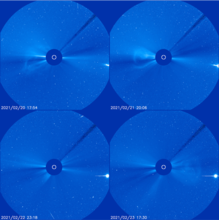news
Submitted on 2021-03-02
A group of European space weather actors proposes to open a discussion on the organisation and sustainability of the European Space Weather community and its assets in the (near) future.
Submitted on 2021-02-25
Solar activity is gradually increasing. From 20 till 23 February, there was 1 CME each day. Only the first one had an earth-directed component, the other CMEs were clearly directed away from Earth or farside events.
Submitted on 2021-02-19
The extreme ultraviolet imager, EUI is 1 full year in space in its VIP seat behind the heath shield from where it peeks through a hole at the Sun. The EUI team worked hard to get down the coolest images ever.
Submitted on 2021-02-18
Space Weather is 'in' and more and more organisations want to learn about it. They are right to do so.
Solar storms drop their energy in the Earth's magnetosphere and atmosphere and as such lie at the basis of space weather. Technology that relies on satellite navigation and radio wave propagation can be impacted by space weather, as well as large energy transport systems like electrical grids. Harmful radiation at flight altitude can increase when a solar storm hits Earth.
Submitted on 2021-02-09
Late on 2 February, a filament near the northwestern solar limb became unstable and erupted. The associated CME was not directed to Earth.
Submitted on 2021-02-01
Last week, in response to the high speed solar wind stream associated with a coronal hole, the level of energetic electrons in the Earth's magnetosphere increased significantly. Fortunately, this time, these "killer electrons" did not permanently phase out a satellite.
Submitted on 2021-01-26
On 22 January, a bright fireball illuminated the morning skies of the Netherlands, Belgium, the United Kingdom and the north of France. BRAMS stations did not capture the radio signal of this fireball due to a particular set of circumstances.
Submitted on 2021-01-19
As seen from Earth, old sunspot group NOAA 2786 has started its third transit of the solar disk.
Submitted on 2021-01-11
A poster with imagery by the PROBA2/SWAP instrument showing the evolution of the Sun's corona in 2020 has been released.
Submitted on 2021-01-04
Based on the sunspot activity of the last few months, Solar Cycle 25 seems to be on a slightly faster track than the previous solar cycle.
Pages
Zircon - This is a contributing Drupal Theme
Design by
WeebPal.





































